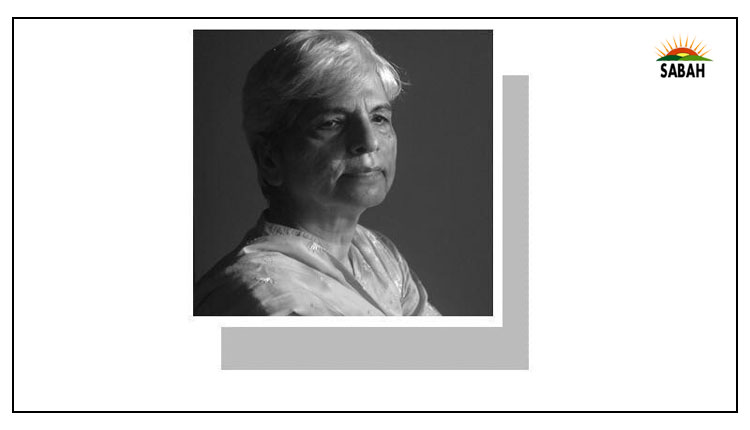Youth and longevity …. Zubeida Mustafa
MUNA Khan’s interesting column titled ‘Forego the FOGO’ (fear of getting old) published recently on these pages was food for thought. She is spot on, especially in her observation that FOGO is driven by the global beauty industry. Muna also writes about seniors in the newsroom today not being valued for their experience. This is probably the consequence of glorifying youth to create FOGO.
When I was young, this phenomenon was called the ‘generation gap’. It existed in every profession and also in family life. But unlike what happens today, the gap was managed in a very civilised manner. When I reached the age of seniority, younger colleagues like Muna and most others of her generation gave me great respect and cooperation, for which I still feel grateful. Obviously, they didn’t suffer from FOGO and so acted their age and observed the courtesies they had learnt. This gap must be accepted in a positive manner if mankind has to progress, otherwise we would still be hunter-gatherers.
My concern today, however, focuses more on the many challenges ‘senior citizens’ face. These issues must be discussed, more so because people are reluctant to talk about them.
One issue pertains to longevity and mortality. In 1950, after the country had somewhat stabilised in the wake of the social upheaval caused by the massive transfer of population during Partition, average life expectancy at birth in Pakistan was estimated at 36.2 years for males and 33.4 for females, according to Wikipedia. Then began the multinational pharmaceutical giants’ global race in quest of alchemy.
Efforts by activists have failed to secure even basic financial support for seniors.
Rooted in earlier global discoveries, research and studies, the manufacture of wonder drugs and medical technologies took off, revolutionising healthcare the world over. Vaccinations dramatically lowered childhood, infant and maternal mortality rates and life expectancy at birth shot up. For instance, in 2023, Pakistan’s life expectancy at birth was estimated to be 65 years for males and 69.7 for females (Worldmetre.info).
The increase in lifespan has been a universal phenomenon. Hong Kong’s life expectancy in 2023 stood at 83 years for males and 88.6 for females. However, in Pakistan, the higher life expectancy has hardly been noticed. Combined with a high birth rate of 2.5 per cent, the increasing lifespan has called for greater focus on issues with a demographic dimension. This has given rise to economic and social problems for the country. No heed has been paid to the advice of a German doctor: “We must add life to years and not years to life.” As has been our wont, the emphasis has been on curative medicine, with little effort to adopt preventive health measures.
Efforts by activists over the decades have failed to secure even basic financial support for seniors. As a result, we have a huge sandwich generation that is doubly burdened. It takes care of its parents as well as offspring with no social security to fall back on. The youth bulge that was supposed to be an asset to the nation is now a liability. The government has failed to give the bulk of the youth a decent education or provide them with a livelihood. It is seething with discontent.
As for seniors, they mainly need support to sustain themselves and for healthcare. Some activities to engage them are also important to create conditions that facilitate mental well-being. Those fortunate to receive a pension have to make do with what is now a pittance at a time when the country’s economy is on the brink.
Not that the government is not aware of these problems. In 2014, the Sindh Assembly adopted the Senior Citizens Social Welfare Act that came into force in 2016. But it never produced any change as the chairman of the council that was set up passed away and the law remained only on paper. In 2019, the Legal Aid Society went to court and some hearings were held, but the issue seems to have been put on the back-burner as normally happens in such circumstances.
Thus the twilight years of many in our society raise questions that call for a discourse to change expectations and produce doable suggestions. A discourse would provide relief from the stresses and strains that come with loneliness. It has been observed that when changes have come after a discourse, the situation has become more manageable.
Some of the sensitive issues pertaining to life and death include: palliative medicine, the question of a ‘living will’, which involves medical options, medical treatment, etc.
I hope this article will not give a boost to FOGO among the young. I must remind them that Botox is not the answer to their fears. It is one’s approach to life, rather than one’s looks, that matters.
www.zubeida-mustafa.com
Courtesy Dawn, May 31st, 2024












